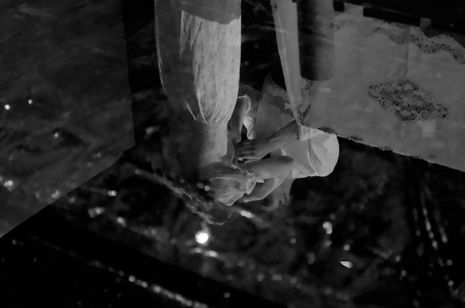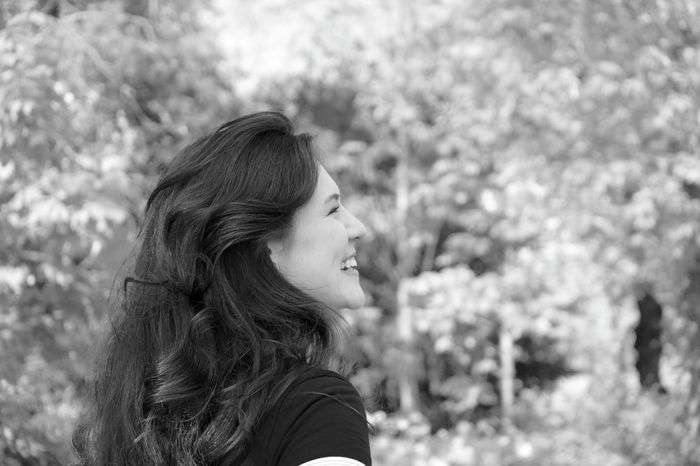Hot summer memories in The Seagull
Incredible acting and design elevate the moderate ambition of Chekhov’s masterpiece

Towards the end of The Seagull’s first half, there is a moment when Trigorin (Jacob Benhayoun) and Nina (Emma Dawes) share an intimate moment by the lake. Time seems to freeze, and I was transported to that universal moment, when in the midst of a summer’s heat and boredom, one falls hopelessly for another.
That moment is vividly given life by Benhayoun and Dawes’ incredible acting — and across the cast, complex characters, with their multiple dimensions, are skilfully performed. Both exude an appropriate level of tenderness, but Benhayoun in particular is a triumph, playing Trigorin with an opportunistic cynicism; he embodies what so many want (success), yet manages to keep the audience sympathetic to his total rejection of it. Dawes manages to mix the cruel naivety of Nina with an appropriate level of candour. Her Nina seems to always be looking off into the distance, chasing something or someone that will never be there, trapping the other characters in her own dreams. The incredible Eirlys Lovell-Jones completes the love triangle perfectly, her persistent ache to reclaim lost glory tempered by a reserved dignity that seems to always be on the verge of cracking.
“Dawes manages to mix the cruel naivety of Nina with the appropriate level of candour”
However, this same complexity is not always fully realised. While I commend Ollie Flowers’ ability to show a reserved level of despair throughout the show, I wanted more from his performance as Konstantin, especially as it leads so much of the play. To me, what makes Konstantin such a compelling character is his ability to show layers of despair — it is not just fuelled by a deep sadness, but by jealousy, lust, anger, trauma, envy, and ambition. These emotions are constantly at play, pulling Konstantin in varying directions with varying intensities, which I could not find in Flowers’ performance. A subdued Konstantin dulled the ending of the play for me, evoking much lower stakes than a man on the verge of suicide, and I was left struggling to understand what had changed in him between his attempts to make the final one successful.
The ensemble overall works in magical ways to paint all the emotional nuance of Chekhov’s characters in its many hues. The way they quip, play lotto, laugh and smile together evokes the feeling of a group of close friends enjoying time together — their camaraderie feels genuine and intimate, the comfort of being familiar with those around you. Irisa Kwok and Liam Macmillan in particular showcased superb nuance - Kwok’s intense longing for Konstantin and dissatisfaction with Medvedenko (played brilliantly by Ebenezer Boakye) was just as lovely to watch as Macmillan’s subtle devastation whilst delivering the infamous last line of the play.
The evocation of a summer vacation of the past is aided incredibly by the design of the play. The superb lighting (by Gwendolen Sellers) and eye-catching set (by Tungsten Tang) perfectly capture a hot summer, with little to do but talk and bask in the light. The set’s emphasis on natural materials creates a feeling of rootedness that contradictorily emphasises the actors running wild with their passions. But as seasons pass, and the play finds itself in winter, the natural world starts to feel more like a curse. What remains seems to eternally taunt the characters of what could have been — lighting shifts to create an atmosphere of insularity and bitterness, showing the long-term impact of a misplaced love.
“What remains seems to eternally taunt the characters of what could have been”
What stops the production from being truly exceptional is that there is a layer of emotion in the text itself, that this production cannot quite access through a naturalistic recreation of the original text. What has made The Seagull so famous was its 1898 production directed by Stanislavski which marked the birth of naturalism on stage. Chekhov’s play drew out a depth of feeling and emotional detail never seen before, with Stanislavski’s direction allowing the actors to tap into their own experiences of those specific emotions. But in the years since then, what love is and how it is expressed has changed. Pattinson tries to bridge this gap by using a 21st century language while retaining the 19th century setting. But, this is a measure that makes for uncanny moments — particularly Masha and Medvedenko’s relationship, which feels oddly tender and an illustration of a modern co-parenting relationship where even if they do not love each other, there is still a source of friendship and affection. This is not necessarily a bad thing, but it means that the play misses what made their relationship a constant source of devastation for audiences at the time — a reminder of what happens when you are stuck in a marriage you cannot escape.
In doing a straight adaptation, Pattinson can’t quite capture all of the ineffable emotional detail that makes The Seagull so devastatingly beautiful. But this is because doing a straight adaptation of Chekov is so difficult. When working at the level of emotional detail that he was working at, most will get lost to time. But it speaks to the ultimately superb quality of the acting and design that The Seagull reaches its emotional height in the first place.
The Seagull plays at the ADC Theatre from Tuesday 16th to Saturday 20th May, 7:30pm
 News / CUP announces funding scheme for under-represented academics19 December 2025
News / CUP announces funding scheme for under-represented academics19 December 2025 News / Cambridge welcomes UK rejoining the Erasmus scheme20 December 2025
News / Cambridge welcomes UK rejoining the Erasmus scheme20 December 2025 News / SU reluctantly registers controversial women’s soc18 December 2025
News / SU reluctantly registers controversial women’s soc18 December 2025 Film & TV / Timothée Chalamet and the era-fication of film marketing21 December 2025
Film & TV / Timothée Chalamet and the era-fication of film marketing21 December 2025 Features / In-person interviews through student helpers’ eyes20 December 2025
Features / In-person interviews through student helpers’ eyes20 December 2025










